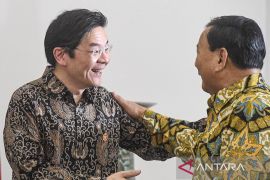Indonesia continued to be flooded with imports because supply at home was not able to meet increasing demand as a result of low production.Jakarta (ANTARA News) - Indonesia`s imports of food products continue to increase every year and now they have accounted for about 65 percent of its needs, a chamber official said.
"As an agricultural country with abundant natural resources, Indonesia turns out to be unable to meet its own domestic need for food products and has to import the products," Natsir Mansyur, a deputy chairman of the Indonesian Chamber of Commerce and Industry (Kadin) said here on Tuesday.
He said that Indonesia continued to be flooded with imports because supply at home was not able to meet increasing demand as a result of low production.
"The food diversification program is only a slogan. The government is only echoing its efforts to achieve its food self-reliance in various sectors such as meat, yet all of this is only set as a normative target without concrete and systematic process to realize it," he said.
In the meantime, agricultural observer of the University of Lampung, Bustnaul Arifin said the government had made mistakes since long ago so that dependence on imported food products could not be avoided.
He said that agriculture was the basis of economic development and the government must have a comprehensive plan to develop agricultural sector.
Leading economist Hendri Saparini said last month that comprehensive policy including fiscal policy is needed to boost the country`s food production to save the country from frequent shortage in supply of food products.
Exemption of import duty, export tax or tax facility for the agricultural sector and small and medium investors and tariff fixation are forms of fiscal policy that could be adopted by the government to create food sovereignty, Saparini, the director of the Econit Advisory Group, said.
"We want the 240 million Indonesians become a huge market for domestic products," she said here on Saturday.
Another form of policy is to allocate a certain budget in the state budget for the state run board of Logistics (Bulog), she added.
"Bulog needs to be strengthened in its role to control supplies of strategic food products," she said.
The government policies must not be partial between Bulog, the agriculture ministry, the trade ministry and related agencies , she said, adding they must make a single well coordinated policy.
"Above all that , there must be big strategy . Short, medium and long term strategies are formed on the big strategy," she said.
Fiscal policy on the agricultural sector such as scrapping of import duty on soybean is short term remedy to deal with crisis such as the recent crisis in soybean supply, she said.(*)
Editor: Heru Purwanto
Copyright © ANTARA 2012











